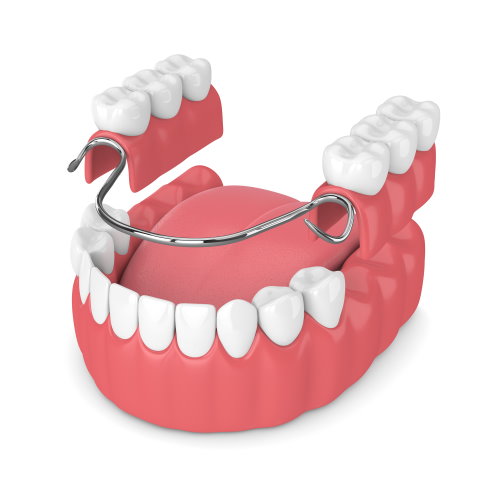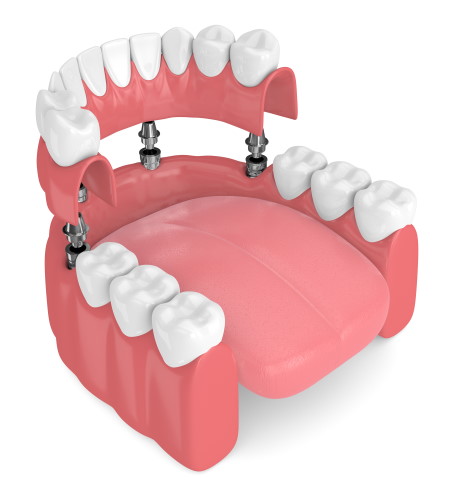Partial Dentures for Missing Teeth
 Several reasons such as tooth decay, dental trauma, gum disease, or a genetic condition cause tooth loss. Having missing teeth not only potentially puts your oral health at risk, but also negatively affects your self-esteem. Fortunately, our skilled and friendly team at Harbor Smiles has a variety of Restorations treatments and can bring back your radiant smile and at the same time, improve your oral health by using dental bridges or dentures. If only a few of your teeth are missing, a partial set of dentures is recommended. These removable partials will prevent facial distortions, lessen the possibility of gum problems, and help in revitalizing your smile.
Several reasons such as tooth decay, dental trauma, gum disease, or a genetic condition cause tooth loss. Having missing teeth not only potentially puts your oral health at risk, but also negatively affects your self-esteem. Fortunately, our skilled and friendly team at Harbor Smiles has a variety of Restorations treatments and can bring back your radiant smile and at the same time, improve your oral health by using dental bridges or dentures. If only a few of your teeth are missing, a partial set of dentures is recommended. These removable partials will prevent facial distortions, lessen the possibility of gum problems, and help in revitalizing your smile.
Contents: Partials vs. Traditional | Types of dentures | How much? | Appointment | FAQ
Partials vs. Traditional Full sets
Generally, there are two types of dentures namely: partial and traditional or full dentures. Both have their share of advantages and disadvantages. You may review the following to know which type of denture suits your needs the best.
- Function – Partial dentures are usually used to replace 2 to 3 consecutive missing teeth in a jaw. If you have lost more than that, then complete or full dentures will be needed.
- Extraction – In partial dentures, the missing teeth are the only ones that need to be replaced while the remaining natural teeth may be kept. On the other hand, full dentures need all of the teeth to be extracted.
- Permanent or Removable – They can be either detachable or permanent. Dental bridges are permanent replacements that can be anchored on dental implants. Full dentures are typically removable.
- Price – Since a partial set only needs to replace a few missing teeth, its price is considerably less than a full set. A traditional or full set requires more materials and additional cost for teeth extraction. Thus, it costs more.
- Stability – The stability of partial dentures is better than complete dentures mainly because they’re still supported by the adjacent natural teeth, dental soft tissues, and jawbone. Full dentures can only depend on soft tissues and jaw bone. Read zinc toxicity.
Types of Partials and Materials used
Depending on your dental needs and your preferences, there are various kinds of partial dentures with different materials. The following are some of the available types of partials:
Cast Metal Removable
This type is placed to reinforce the teeth using metallic wire clasps. It is the most common type of partials and is characterized by its exceptional durability. With their strength and constant oral care, it can last for several years. Other cosmetic attachments aside from the metal wire clasps are also available but cost higher.
Acrylic Removable
It is the cheapest among the partial types and is generally used as a temporary solution while waiting for the preparation of the actual restoration of the teeth. They are also known as the “flipper” and utilize a bulky acrylic base to lessen the possibility of damage. Placed on the support teeth using metal clasps, they are noticeable when speaking, smiling, or laughing.
Flexible
This type of partials is constructed from heat-sensitive and flexible nylon material. With a thin base and gum-colored wire clasps, it is the most comfortable to wear out of the available partial types. Moreover, since the clasps are gum-colored, they look more natural and will not affect one’s outer appearance.
Fixed Bridge Partial
It is a permanent restoration that utilizes artificial teeth with a dental crown attached on either side. This type of partial restoration is most suited for patients with 1 or 2 missing teeth.
Implant-Supported Fixed Bridge
 Dental bridges are permanent replacements that can be anchored on dental implants. Since the implants are integrated into the jawbone and serve as the roots of a natural tooth, with enough numbers placed at proper locations, a full-mouth fixture is possible. Clear from the restraints of traditional false teeth options, implant-supported permanent bridges are becoming more popular.
Dental bridges are permanent replacements that can be anchored on dental implants. Since the implants are integrated into the jawbone and serve as the roots of a natural tooth, with enough numbers placed at proper locations, a full-mouth fixture is possible. Clear from the restraints of traditional false teeth options, implant-supported permanent bridges are becoming more popular.
Harbor Smiles highly suggests the implant-supported removable or fixed kind due to their extreme durability and comfortability. They will also feel and look like natural teeth. The final decision will still depend on your dental needs and preferences. We will give our utmost assistance for you to be able to reach the best conclusion suited for your condition.
How much does Partial Dentures cost?
Various aspects such as the number of missing teeth that need replacement, their location, the type of materials of the dentures, and operating costs contribute to the total cost of partial dentures. Generally, the price for a partial set is about $400 to $1,800 per arch. If you have dental insurance, it will help you cover a portion of the total cost.
Partial false teeth nearby
If you are looking for a nearby dental office that can provide a professional and comfortable partial denture treatment, we at Harbor Smiles located in Huntington Beach, CA are delighted to be of service. You may schedule an appointment and visit our office to know more details about us, more information about the partial denture service we provide and its costs, and the insurance providers we accept. Our caring and skilled team is eager to meet you and help you get back your radiant smile.
Our Experienced Dentists Will Help With Your Custom Set of New Teeth
Tired of feeling embarrassed with missing teeth? We at Harbor Smiles are eager to assist you in gaining back your confidence and achieve a brighter smile. We provide one of the best Complete dentures procedure experience for whole mouth in Huntington Beach, CA.
Find out more About Us.
FAQs for Artificial Partial Teeth
What are the best partial dentures to get?
Various kinds of partial dentures are available at Harbor Smiles. It will depend on the patient’s dental needs and preferences when it comes to choosing partial dentures. However, a lot of patients concur that a flexible partial denture is more comfortable to wear since it’s lightweight and malleable compared to the other types of partials. Schedule an Appointment with Dr. Manali Patel DDS.
How much is a flexible partial?
Normally lighter than acrylic dentures, the price for flexible partials is between $800 and $3000. The cost will still vary depending on certain factors like the materials utilized on the dentures and the missing teeth’ location.
Can you eat with partials?
Yes, you can. However, it may take a while for you to get used to eating while wearing partials as they may not feel that natural compared to your original teeth. It is recommended to prevent eating hard foods such as nuts, hard-to-chew meats, popcorn, and hard candy. If you have partial front teeth, refrain from biting into foods such as apples. It is better to slice them into small pieces and chew them with your back molars.
Source:
- Denture ulcerations https://doi.org/10.1038%2Fsj.bdj.2008.815
- Dentures, 1790–1799
Related Posts:
